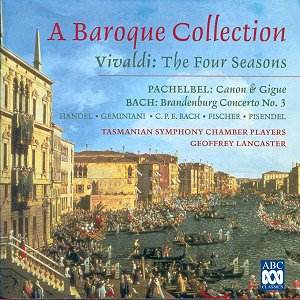Recorded between 1989 and 1990 this collection returns
to the catalogue as an ABC double sporting the Four Seasons as
its centre of attention but presenting a pleasurable mix of familiar
and unusual. Based on an early edition in the Henry Watson Music Library
in Manchester the modern instrument Tasmanian Symphony Chamber Players’
performance precepts in the Vivaldi are outlined in a bullish note written
by harpsichordist and director, Geoffrey Lancaster. I’m not sure if
castigating most of the Vivaldi-performing musical world for its promotion
of "pseudo-divinity" in interpretation is a wise policy; it
provokes in my mind, at least, Harold Samuel’s celebrated retort to
harpsichordist Wanda Landowska when she harangued him for half an hour
on the artistic, historical and aesthetic superiority of her instrument
in performance of Bach and Rameau –"But Madame Landowska, I don’t
like the harpsichord."
In the same spirit if you’re going to insult international
performances of The Four Seasons you’d better be damn sure that
your own house is in order. The implication that only this band has
the approved access to correct performance practice is in itself ridiculous
and I think the best policy is to put the stridency of the documentation
to one side and listen clearly and coolly to the music making, which
is significantly less afflicted with the need to show off than is the
text. Care in matters of dynamics is clear from the start, as are, less
attractively, those manifold little swells and bulges that distend and
fracture the line in so many performances. The bass line in the Largo
of Spring is strong and supportive; note values are well considered
in the first movement of Summer; Autumn is neatly and imaginatively
phrased; and the band generate a real sense of expectancy at the start
of the Allegro non molto of Winter. In the famous Largo of Winter the
violin is almost inaudible behind the skittish and venomously engorged
pizzicati – I assume that it’s performed this way in order to exemplify
the Orchestra’s so-called "credo" of anti-Romantic sensibility.
Well, live by the sword, die by the sword - it sounds awful.
Elsewhere the performances are generally sound. CPE
Bach’s abrupt conjunctions are well conveyed, the lean tone suitable
for exemplifying, for example, the wandering chromaticisms of the slow
movement of his Symphony for Strings, its apparently discursive material
cohesively entertained. I liked the eruptive and confident feel to the
Presto Finale as well. Matters of ornamentation enliven performance
of Handel’s A Major Concerto grosso and the recording of Gemimani’s
concerto grosso No 4 is claimed as a first recording using parts in
Amsterdam. I wasn’t especially taken with the Bach Brandenburg – rather
inflexibly aggressive – but enjoyed the Pachelbel.
Jonathan Woolf


